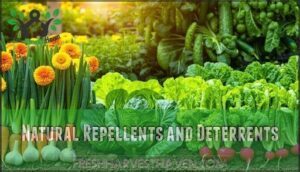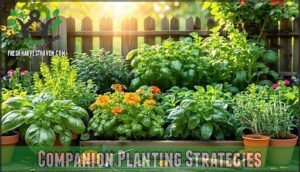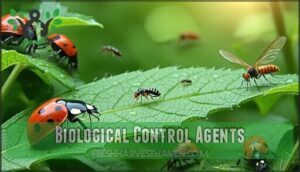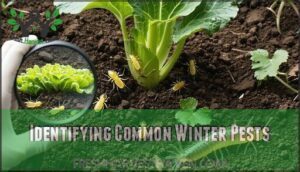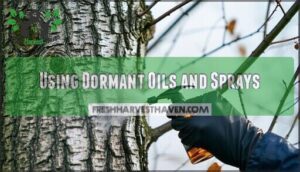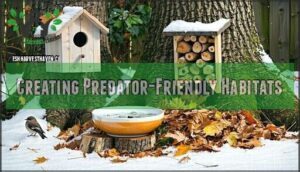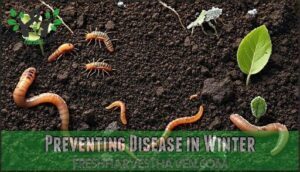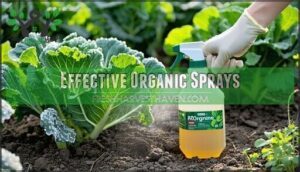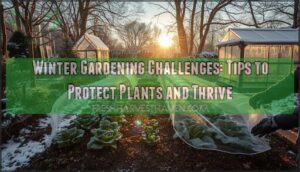This site is supported by our readers. We may earn a commission, at no cost to you, if you purchase through links.
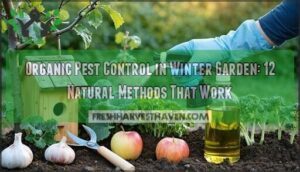
Start with proper preparation—prune dead branches and clear fallen debris where pests hide, then sanitize your tools with rubbing alcohol between cuts.
Apply dormant oils before bud break to suffocate overwintering eggs on trees and shrubs.
Use companion plants like garlic and marigolds as natural deterrents, while encouraging beneficial predators with birdhouses and insect hotels.
Organic sprays containing neem oil or insecticidal soap disrupt pest lifecycles without harming your plants.
The secret to effective organic pest control in winter garden management lies in timing these applications correctly and combining multiple strategies for maximum impact.
Table Of Contents
- Key Takeaways
- Winter Garden Preparation
- Organic Pest Control Methods
- Managing Winter Pests
- Preventing Disease in Winter
- Effective Organic Sprays
- Frequently Asked Questions (FAQs)
- Can you do pest control in the winter?
- How do organic farmers control pests without chemicals?
- Why should you learn organic pest prevention methods?
- How do I get rid of pests in my garden?
- How do you manage pests naturally?
- How does cultural control affect organic pest management?
- Are pests a gardener’s worst nightmare?
- How to prevent pests from finding your crops?
- How to control pests in a garden organically?
- How to get rid of overwintering garden pests?
- Conclusion
Key Takeaways
- Start with winter preparation – You’ll need to prune dead branches, clear fallen debris, and sanitize your tools with rubbing alcohol between cuts to eliminate pest hiding spots before problems develop.
- Apply dormant oils strategically – Use horticultural oils before bud break when temperatures stay above 40°F for 24 hours to suffocate overwintering eggs on trees and shrubs.
- Create natural barriers – You can plant companion crops like garlic with brassicas and marigolds near vegetables while building insect hotels and birdhouses to encourage beneficial predators.
- Rotate organic sprays effectively – Mix neem oil, insecticidal soap, and pyrethrin in weekly rotations, applying during late afternoons on mild days for maximum pest control without harming beneficial insects.
Winter Garden Preparation
Proper winter garden preparation forms the foundation of effective organic pest control, preventing problems before they develop during dormant months.
You’ll need to focus on thorough pruning and cleaning to remove pest breeding grounds, while strategic mulching and weed management create an inhospitable environment for overwintering pests, which is crucial for effective prevention.
Pruning and Cleaning
Dormant pruning and winter cleaning form your garden’s first line of defense against overwintering pests and diseases.
You’ll eliminate hiding spots where garden sanitation problems develop, creating an inhospitable environment for winter garden pests through proper tool sanitation and debris removal.
- Prune dead branches – Remove diseased wood during dormancy to prevent pest harboring
- Sanitize cutting tools – Clean pruners with rubbing alcohol between plants
- Clear fallen debris – Remove leaves and plant matter where pests overwinter
- Inspect for damage – Check bark for insect eggs or fungal infections
Mulching and Weed Management
After thorough pruning and cleaning, apply a thick layer of organic mulch around your plants to create an effective weed barrier.
This winter groundcover suppresses unwanted growth while regulating soil temperature, preventing pest breeding grounds.
Use organic covers like shredded leaves, straw, or wood chips for garden bedding that doubles as natural pest control, making weed management simpler throughout the dormant season.
Effective soil preparation techniques are vital for maintaining a healthy winter garden, allowing for ideal plant growth and development, which is a key part of winter garden care and natural pest control.
Organic Pest Control Methods
Winter garden pest control requires strategic planning before problems emerge, not reactive measures after pests establish themselves.
You’ll find success by combining natural repellents, companion plantings, and biological controls to create an integrated defense system that works throughout the dormant season, using biological controls.
Natural Repellents and Deterrents
Natural repellents offer effective organic pest control without harsh chemicals. Essential oils like peppermint reduce pest presence by 60%, while coffee grounds deter slugs and snails by 55%. These methods work through scent disruption and physical barriers.
Nature’s arsenal beats synthetic sprays—essential oils and coffee grounds create impenetrable pest barriers
Nature’s pest control beats chemicals every time—essential oils and coffee grounds create barriers pests can’t cross.
Many gardeners rely on natural repellent methods to protect their plants.
- Garlic Repellent and Onion Deterrent: Plant around root crops to repel carrot flies and root maggots with natural sulfur compounds.
- Marigold Protection with Chrysanthemum Spray: Use marigolds near brassicas while applying chrysanthemum-based sprays for thorough pest prevention.
- Radish Barrier Systems: Create protective borders around beans and cucumbers, deterring beetles through natural chemical emissions.
Companion Planting Strategies
Beyond chemical deterrents, companion planting creates a living shield against winter pests through strategic plant partnerships.
This method harnesses natural relationships where certain plants protect others, enhancing soil health and supporting garden diversity year-round.
| Plant Partners | Winter Pest Control Benefit |
|---|---|
| Garlic + Brassicas | Repels root maggots and aphids |
| Onions + Carrots | Deters carrot flies and wireworms |
| Marigolds + Cabbage | Reduces cabbage worm populations |
| Chrysanthemums + Garden Borders | Controls overwintering beetles and ants |
| Radishes + Root Crops | Breaks pest cycles in soil |
Crop rotation amplifies companion planting effectiveness by preventing pest buildup in soil.
Beneficial flowers like marigolds attract natural predators while deterring harmful insects.
This organic pest control approach strengthens your garden’s natural defenses, creating sustainable protection that beneficial insects support throughout winter months, using natural relationships and strategic plant partnerships to enhance soil health and support garden diversity.
Biological Control Agents
You can harness biological control agents to fight winter pests naturally.
Beneficial insects like ladybugs and lacewings consume up to 200 aphids weekly, while predatory mites tackle spider mites effectively.
Release parasitic wasps against whiteflies in protected environments, achieving 80-95% population reduction.
Apply entomopathogenic nematodes to soil for grubs and cutworms—they’re safe for plants and pets.
These natural predators work as living pesticides, forming your garden’s defense team.
This approach reduces pest density through natural enemies such as predators and parasites, utilizing natural enemies to create a balanced ecosystem.
Managing Winter Pests
Winter brings unique pest challenges that require strategic organic approaches.
You’ll need to identify overwintering pests like aphids, scale insects, and spider mites while using dormant oils and creating habitats that support beneficial predators through the colder months, which is a key part of using dormant oils.
Identifying Common Winter Pests
Knowing your enemy makes all the difference when protecting your winter gardening efforts. Common winter pests like aphids persist through mild winters, clustering on perennials and young shoots. Spider mites attack evergreen plants during dry spells, while slugs hide beneath mulch layers.
Proper pest identification requires regular monitoring with magnifying glasses and sticky traps for accurate pest monitoring in cold climate conditions.
- Silent destroyers: Fungus gnats attack seedling roots in greenhouse environments, causing damping-off before you notice
- Hidden threats: Cabbage root maggots tunnel through brassica roots, creating rot that stunts your cold-resistant plants
- Persistent invaders: Soil pests remain active beneath frost damage protection, feeding on garden pests throughout winter months
Using Dormant Oils and Sprays
Dormant oil applications represent your most effective winter weapon against overwintering pests on trees and shrubs.
These horticultural oils suffocate insect eggs and larvae by blocking their breathing pores, making them essential for thorough pest control methods during dormant plant care seasons.
| Oil Type | Best Application Time |
|---|---|
| Horticultural Oil | Late winter before bud break |
| Neem Oil | Early winter and late winter |
| Superior Oil | Mid-winter during warmest days |
Apply organic sprays when temperatures stay above 40°F for 24 hours, ensuring thorough coverage of bark crevices where pests hide.
Winter sprays work best on calm, dry days, targeting scale insects, aphid eggs, and mites that plague your winter gardening efforts.
Creating Predator-Friendly Habitats
Beneficial predators thrive when you provide winter shelter, transforming your garden pest control strategy.
Winter shelter creates natural allies—beneficial predators emerge stronger, ready to defend your garden
These natural allies need specific habitats to survive harsh conditions and emerge ready to tackle spring pest populations.
Essential habitat elements for predator survival:
- Birdhouse Placement and Bat Boxes – Position structures 5-10 feet high in sheltered locations to protect insectivorous birds and bats that consume thousands of garden pests annually.
- Insect Hotels and Brush Piles – Create overwintering sites using hollow stems, wood blocks, and leaf litter that increase beneficial insect survival by 70% through winter months.
- Water Sources and Plant Diversity – Maintain shallow dishes and diverse native plantings that support predatory beetles, spiders, and parasitic wasps year-round while limiting pesticides preserves these populations.
Consider planting native flowering species to attract beneficial insects.
Preventing Disease in Winter
Winter disease prevention requires a proactive approach that combines proper sanitation with strategic soil management.
You’ll protect your garden by maintaining clean tools, removing infected plant material, and creating healthy conditions that naturally resist disease development.
Sanitizing and Disinfecting Tools
Clean tools between plants to stop disease spread. Use a 10% bleach solution or 70% rubbing alcohol for tool sterilization.
Wipe pruners, shears, and shovels after each use. For a thorough approach, consider using a specialized tool cleaner.
Store tools in dry areas to prevent rust and contamination. Sharp, clean tools make precise cuts that heal faster, reducing infection points.
This simple garden pest control practice protects your organic gardening investment through proper garden care and natural remedies.
Removing Diseased Plant Material
Through systematic plant inspection, you’ll identify diseased material by looking for discolored leaves, wilted stems, and unusual growths.
Remove infected parts immediately using sanitized tools to prevent Disease Spread Prevention.
Practice Safe Disposal Methods by burning or bagging diseased material—never compost it, as Composting Considerations include avoiding pathogens that survive decomposition.
Tool Sanitation Importance can’t be overstated; clean blades between cuts. This garden cleanliness approach controls garden diseases effectively.
Improving Soil Health and Structure
Healthy soil acts as your garden’s immune system, fighting diseases before they take hold.
Winter composting and cover cropping boost the soil food web, creating natural disease resistance through enhanced nutrient cycling.
Regular soil testing guides targeted soil amendments, while aeration practices prevent waterlogged conditions that harbor pathogens.
These soil preparation strategies establish robust soil fertility foundations.
Effective Organic Sprays
When traditional prevention methods aren’t enough, targeted organic sprays become your winter garden’s defense system against persistent pests and diseases.
These natural formulations work by disrupting pest life cycles and creating hostile environments for harmful organisms, while remaining safe for beneficial insects and soil health.
Neem Oil and Insecticidal Soap
Combining neem oil and insecticidal soap creates powerful organic solutions for winter protection.
These organic methods work synergistically, with neem oil disrupting pest hormones while soap breaks down protective cuticles for rapid elimination.
- Neem Oil Benefits: Controls overwintering aphids, mites, and whiteflies with 85% mortality rates after two applications
- Soap Application Timing: Apply insecticidal soap as morning contact spray to maximize pest exposure and limit leaf damage
- Oil vs. Soap: Sequential treatments using neem oil biweekly followed by weekly soap applications yield superior pest suppression rates. You can also try planting basil nearby to deter flies and mosquitoes.
Pyrethrin and Diatomaceous Earth
Pyrethrin application targets garden insects by attacking their nervous systems, causing paralysis within minutes of contact.
This organic pest control compound, derived from chrysanthemum flowers, offers excellent DE effectiveness when combined with diatomaceous earth for winter protection.
You can find various spray options online.
Safety precautions include evening applications to protect beneficial insects, while pest resistance remains minimal due to pyrethrin’s natural breakdown properties, making winter usage particularly effective against overwintering pests.
Mixing and Applying Organic Sprays
Proper mixing turns organic sprays into powerful pest control tools when you follow precise dilution ratios and safety precautions.
Mix small batches with lukewarm water using dedicated equipment to prevent cross-contamination.
Apply during ideal spray timing—late afternoon on mild days—using fine-mist nozzles for complete coverage.
Rotate application techniques weekly between neem oil, BT, and pyrethrin to maximize effectiveness in your winter garden pest management strategy.
Frequently Asked Questions (FAQs)
Can you do pest control in the winter?
Winter doesn’t halt pest activity—it simply shifts it.
You can absolutely control pests during dormancy through dormant oils, organic mulch, pruning diseased branches, and applying beneficial nematodes to target overwintering insects, using methods like beneficial nematodes.
How do organic farmers control pests without chemicals?
Organic farmers use integrated pest management, combining companion planting, natural predators, beneficial insects, crop rotation, and organic sprays like neem oil to control pests naturally without synthetic chemicals.
Why should you learn organic pest prevention methods?
Picture your garden as a fortress where chemical warfare isn’t your only weapon.
You’ll master organic pest prevention to safeguard your family’s health, protect beneficial insects, maintain soil health, and create sustainable growing systems that work with nature’s balance rather than against it.
This approach allows you to create a sustainable growing system.
How do I get rid of pests in my garden?
Target pests with integrated management: monitor regularly, use companion planting like marigolds with brassicas,
encourage beneficial insects through diverse flowers.
Apply organic sprays like neem oil weekly, and maintain garden hygiene by removing diseased plants to target pests effectively with integrated management.
How do you manage pests naturally?
Beneficial insects control up to 80% of garden pests naturally.
You’ll attract predators like ladybugs using diverse flowering plants, create habitats with insect hotels, and apply organic sprays like neem oil weekly to manage populations without harming beneficial species.
How does cultural control affect organic pest management?
Cultural control forms the backbone of organic pest management by creating unfavorable conditions for pests through strategic garden practices.
You’ll disrupt pest lifecycles using crop rotation, proper spacing, and sanitation, while strengthening plant resilience naturally, which is a key part of organic pest management.
Are pests a gardener’s worst nightmare?
Sarah’s tomato plants fell victim to hornworms last summer, but they’re manageable challenges, not nightmares.
You’ll face pests, but with proper planning, companion planting, and organic controls, they become predictable obstacles you can successfully overcome.
How to prevent pests from finding your crops?
You’ll outsmart pests by rotating crops annually, companion planting garlic with vegetables, using row covers, maintaining clean garden beds, and applying organic mulch to disrupt their breeding cycles naturally.
How to control pests in a garden organically?
You’ll need neem oil, spinosad, BT, and pyrethrin in weekly rotation. Spray evenings to protect beneficial insects. Companion plant with marigolds and garlic while encouraging natural predators through diverse plantings.
How to get rid of overwintering garden pests?
Winter’s harshest conditions can’t stop determined overwintering pests from wreaking havoc on your garden.
Apply dormant oils to trees and shrubs, use organic mulch to disrupt pest habitats.
Conduct regular garden checks to catch slugs, snails, and soil insects early.
Conclusion
Like Frost’s gardener preparing for winter’s siege, you’ve now armed yourself with twelve proven strategies to protect your plants naturally.
Implementing organic pest control in winter garden management requires consistent vigilance and proper timing.
Your dormant oil applications, companion plantings, and beneficial habitats will create a balanced ecosystem that keeps pests at bay.
Remember, combining multiple methods yields the strongest defense against winter invaders, ensuring your garden emerges healthy and thriving when spring arrives, with a focus on proper timing and consistent vigilance.
- https://news.ca.uky.edu/article/beneficial-insects-theyre-good-bugs
- https://pnwhandbooks.org/insect/ipm/biological-control
- https://extension.illinois.edu/blogs/commercial-fruit-and-vegetable-growers/2024-11-27-winter-insect-pest-control
- https://extension.psu.edu/insect-parasitic-nematodes-for-the-management-of-soil-dwelling-insects/
- https://www.sciencedirect.com/science/article/abs/pii/S0929139316305042

